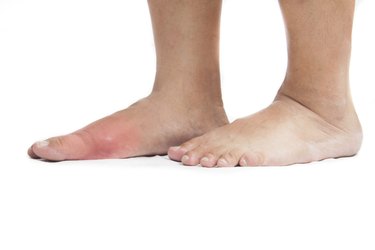
Lowering uric acid levels plays a role in managing gout symptoms. Your body produces uric acid as a byproduct of breaking down substances in food called purines. In addition to consuming a low-purine diet, getting enough of certain nutrients may help lower uric acid levels. Scientists are only in the beginning stages of testing this hypothesis, however.
Right now, there is no definitive evidence that certain vitamins lower uric acid. Don't start taking vitamins or make any major changes to your diet without consulting your doctor.
Video of the Day
Video of the Day
Risk Factors and Treatment
Men are at a higher risk of gout than women. You're also at an increased risk if you're overweight, consume excess alcohol or have a family history of gout. Certain medications, such as diuretics, increase gout risk as well. Doctors prescribe medication to control this condition. In addition, limiting foods high in purines helps reduce uric acid. Organ meats, certain fish, game meats, broths, gravies, scallops and mussels are high in purines and must be avoided, according to the Mytrue Medical Center.
Vitamin C
Investigators have found that supplementing vitamin C significantly lowers uric acid levels in healthy adults, according to a review of published studies. The researchers reviewed the results of trials published in various databases, including the Cochrane Database of Systematic Reviews. The authors write that more studies are needed to determine whether vitamin C can prevent gout attacks or lower abnormally high uric acid levels in gout sufferers. The review was published in the September 2011 issue of the journal Athritis Care Research.
A separate study published in the March 2009 issue of the journal Archives of Internal Medicine, however, found that low vitamin C intake increases the risk of gout in men.
Vitamin D
Among postmenopausal women, researchers have found a link between vitamin D deficiency and elevated uric acid. Investigators conducted a population study on Chinese women over the age of 30. They found that women who had healthy vitamin D levels were less likely to have high uric acid, even after taking into account other health factors, like diabetes. The authors recommend that a clinical trial be conducted to confirm the link and determine whether taking vitamin D lowers uric acid.
Cherries May Lower Uric Acid
Because small experimental studies have shown that cherries lower uric acid levels, researchers sought to determine whether eating cherries reduces gout attacks. Investigators evaluated cherry consumption in more than 600 people with gout and published their findings in the December 2012 issue of the journal Arthritis and Rheumatism. They found that consuming cherries daily resulted in a 35 percent lower risk of recurrent gout attacks. Combining cherry intake with the use of the gout medication allopurinol reduced gout attacks by 75 percent, according to the study.
- Athritis Care Research: Effect of Oral Vitamin C Supplementation on Serum Uric Acid: a Meta-analysis of Randomized Controlled Trials
- PLOS One: Association Between Vitamin D Insufficiency and Elevated Serum Uric Acid Among Middle-Aged and Elderly Chinese Han Women
- Arthritis and Rheumatism: Cherry Consumption and Decreased Risk of Recurrent Gout Attacks
- Archives of Internal Medicine: Vitamin C Intake and the Risk of Gout in Men – A Prospective Study
- National Institutes of Health: Gout
- Mytrue Medical Center: Low-Purine Diet